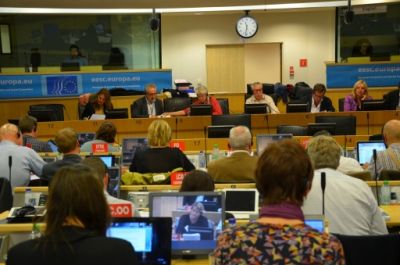
Position adopted by the Executive Committee of 17-18 June 2015
In December 2015, countries will meet in Paris under the UN auspices to seal a new global agreement to fight climate change. Ahead of this crucial summit, the ETUC reiterates its key demands to Parties, and specifically to the EU which must continue to play a leading role in the negotiations.
Legal commitments for all Parties based on shared but differentiated responsibilities
Keeping global warming well below 2°C requires ambitious mitigation measures in order to make the world carbon-neutral by the end of the 21st century, pursuant to the recommendations of the IPCC Fifth Assessment Report. As a step in that direction, the Paris climate conference must deliver a legally binding agreement made up of firm, clear and comparable commitments for 2030 from all Parties, reflecting common but differentiated responsibilities. COP 21 must also deliver a credible roadmap combining a quantified, long-term emission objective and intermediate targets to be reached by the different categories of countries. A collection of national pledges will not provide the kind of global political breakthrough climate change urgently requires today.
The Paris conference must also accelerate short-term action against climate change by ensuring the enforcement of existing commitments, notably under the Kyoto Protocol.
Just transition and decent work must be part of the agreement
Shifting from a fossil-fuel to a carbon-free economy cannot be done without changing the labour market at the same time. Placing just transition and decent work at the heart of the Paris agreement will demonstrate the Parties’ commitment to coupling the de-carbonisation of their economies with a strong social agenda comprising investment in creating quality jobs, workers’ participation, greening of skills and curricula, social protection and respect for labour rights. Making a low-carbon economy a desirable prospect for all is key to ensuring public support for the transition.
Equity as a cornerstone
Rich countries must lead the global fight against climate change, not only by drastically reducing their emissions but also by offering poorer countries the support they need for implementing mitigation and adaptation measures. It means that developed countries must stick to the financial commitments they made in Copenhagen. It is obvious, however, that these commitments will not provide sufficient resources to address the financial needs created by climate change. Financial transaction tax, share of proceeds from flexible mechanisms, financial contributions from international transport, and phasing out of environmentally harmful subsidies are all ways of generating additional financial resources to tackle climate change. Pension Funds but also all kind of private investment should contribute to the transition towards a low-carbon economy in a way which is socially and environmentally responsible.
Participation of all groups must be promoted and acknowledged
The transition ahead requires the participation of all stakeholders, and trade unions have a strong role to play in the changes this will entail for the labour market. Since Rio 1992, ensuring broad public participation in decision-making has been identified as a major prerequisite for sustainable development. To that end, Agenda 21 identifies nine major groups within civil society and promotes the strengthening of the role of workers and their trade unions. Ensuring a comprehensive and balanced representation of these groups is now a common practice within the UN system and UNFCCC texts should not be an exception. The Paris agreement must firmly promote and acknowledge the role played by all major groups, and notably by trade union organisations.
Respect for human rights and workers’ rights
The future climate regime must respect human and workers’ rights. All mechanisms, including project-based mechanisms, must be based on democratic decision-making and ensure respect for human rights in all countries. Mitigation actions should not jeopardise the right to land, water, affordable energy and other fundamental rights of workers and local communities.
